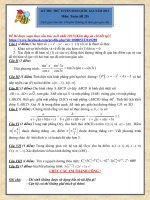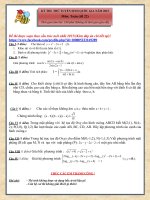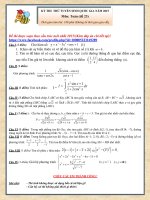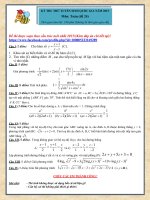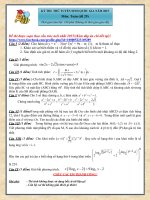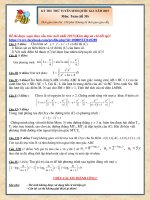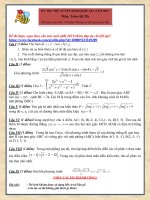- Trang chủ >>
- THPT Quốc Gia >>
- Ngoại Ngữ
ĐỀ THI THỬ THPT QUỐC GIA TIẾNG ANH CHỌN lọc đh NGOẠI THƯƠNG lần 1
Bạn đang xem bản rút gọn của tài liệu. Xem và tải ngay bản đầy đủ của tài liệu tại đây (389.92 KB, 6 trang )
TR
L
NG ĐH NGO I TH
NG
Đ THI TH
ng Thùy LB s u t m và gi i thi u
THPT QU C GIA NĂM
Môn: Ti ng Anh
Th i gian làm bài: 60 phút
Mark the letter A, B, C, or D on your answer sheet to indicate the word
whose underlined part differs from the other three in pronunciation in
each of the following questions.
Question 1: A. empty
Question 2: A. scholar
B. deny
B. character
C. sleepy
C. charity
D. hurry
D. chemist
Mark the letter A, B, C, or D on your answer sheet to indicate the word
that differs from the other three in the position of primary stress in each
of the following questions.
Question 3: A. history
Question 4: A. career
B. musician
B. agree
C. computer
C. coffee
D. conclusion
D. fourteen
Mark the letter A, B, C, or D on your answer sheet to indicate the
underlined part that needs correction in each of the following questions.
Question 5: Some underground water is enough safe to drink, but all surface water
A
B
C
must be treated.
D
Question 6: Stars in our universe vary in temperature, color, bright, size, and mass.
A
B
C
D
Question 7: Neither Russia nor the United States have been able to discover a
A
B
mutually satisfactory plan for gradual disarmament.
C
D
Mark the letter A, B, C, or D on your answer sheet to indicate the word(s)
CLOSEST in meaning to the underlined word(s) in each of the following
questions.
Question 8: Parsley is cultivated throughout much of the world.
A. seen
B. cooked
C. grown
D. bought
Question 9: While some bacteria are beneficial, others are harmful in that they
cause disease.
A. detrimental
B. curative
C. demanding
D. dominant
Mark the letter A, B, C, or D on your answer sheet to indicate the word(s)
OPPOSITE in meaning to the underlined word(s) in each of the following
questions.
Question 10: He was killed in a tragic accident at the age of 24.
A. boring
B. comic
C. unhappy
D. mysterious
Question 11: He decided to make Hanoi his permanent home.
A. intermittent
B. solitary
C. frivolous
D. temporary
Mark the letter A, B, C, or D on your answer sheet to indicate the correct
answer to each of the following questions.
Question 12: The planet Mercury _____ round the Sun every eighty-eight days.
A. has travelled
B. is travelling
C. travelled
D. travels
Question 13: There is _____ horror movie on _____ TV tonight.
A. a/the
B. the/0
C. a/0
D. 0/0
Question 14: _____ you start, _____ you will finish.
A. The soon/the more quickly
B. The sooner/the quicker
C. The sooner/the quickly
D. The sooner/the more quickly
Question 15: We arrived _____ Ho Chi Minh City _____ 9 p.m. ____ a hot summer
day.
A. in/at/on
B. at/in/in
C. to/at/in
D. on/of/on
Question 16: There is too _____ bad news on TV tonight.
A. many
B. much
C. a few
D. a little
Question 17: You should seriously consider ____ a dancer. You are such a great
performer.
A. becoming
B. to become
C. become
D. will become
Question 18: The doctor recommended that the patient _____ as soon as possible.
A. is operated
B. operated
C. would be operated
D. be operated
Question 19: Not until now _____ popularly recognized that man is destroying the
environment.
A. has it become
B. does it become C. it has become
D. it becomes
Question 20: If I were you, I would take more _____ in my work.
A. confidenc
B. pride
C. dedication
D. solution
Question 21: Her mother told her not to be too _____ and advised her to try to do
things herself.
A. independent
B. dependence
C. depending
D. dependent
Question 22: Jack has two elder brothers, _____ are famous actors.
A. both of which
B. both of who
C. both of whom
D. both of them
Question 23: Susan was alone in the house when the fire _____.
A. broke out
B. broke down
C. broke up
D. broke away.
Mark the letter A, B, C, or D on your answer sheet to indicate the most
suitable response to complete each of the following exchanges.
Question 24: Lisa and Rachel are talking on the phone.
- Lisa: “Would you like to go to the cinema with me tonight?” - Rachel:
“_____.”
A. Yes, I’d love to B. Yes, please
C. No, thanks
D. Sorry
Question 25: Henry is talking to his mother.
- Henry: “I’ve passed my driving test.”
- His mother: “_____.”
A. All right.
B. That’s too bad
C. That’s a good idea
D. Congratulations
Mark the letter A, B, C, or D on your answer sheet to indicate the sentence
that is closest in meaning to each of the following questions.
Question 26: He must have cancelled his e-mail account, as I can’t get
hold of him.
A. I must have got his e-mail address wrong, because he’s not giving me any
reply.
B. If no one is able to get in contact with him, he ought to get an e-mail account
for himself.
C. Since I’m unable to get in contact with him, it seems certain that he’s closed
his e-mail account.
D. He may have closed his e-mail account, but I won’t know for sure until I get
in touch with him.
Question 27: Only customers with coupons may use the service.
A. The service is available for coupons only.
B. The service is restricted to customers in possession of coupons.
C. Only rich customers can use the service with coupons.
D. Only customers with coupons are service here.
Question 28: “You must do what you are told,” said the woman.
A. The woman said that I had to do what I was told.
B. The woman said that I must do what I was told.
C. The woman said I should have done what I was told.
D. The woman said I should do what I was told.
Mark the letter A, B, C, or D on your answer sheet to indicate the sentence
that best combines each pair of sentences in the following questions.
Question 29: The burglar might come back. You’d better change all the
locks.
A. You’d better change all the locks or the burglar will come back.
B. You’d better change all the locks in case the burglar comes back.
C. If you don’t change all the locks, the burglar could come back.
D. The burglar will come back unless you change all the locks.
Question 30: The student next to me kept chewing gum. That bothered
me a lot.
A. The student next to me kept chewing gum bothering me a lot.
B. The student next to me kept chewing gum, that bothered me a lot.
C. The student next to me kept chewing gum bothered me a lot.
D. The student next to me kept chewing gum, which bothered me a lot.
Read the following passage and mark the letter A, B, C, or D on your
answer sheet to indicate the correct word or phrase that best fits each of
the numbered blanks from 31 to 35.
ON YOUR BIKE!
If you are getting (31)_____ up wasting time looking for parking spaces, my
advice to you is to consider the bicycle as an alternate means of transport. Cycling
is probably the cheapest and healthiest way of getting (32)_____ in our congested
city centers. Although it is convenient and environmentally desirable, it can be
unattractive choice on a cold windy morning. It is much easier to get onto a nice
warm bus or jump into your car, but the sight of cyclists as they weave their way in
and out of the traffic may fill you with (33)_____ as you sit waiting in yet another
traffic jam. In spite of the fact that worsening pollution is getting many people
(34)_____, causing more and more health problems, and while it is fashionable to
express one’s approval of the environmentally safe bicycle, it is hard to deny the
danger cyclists face in sharing the road with cars. Although cycling is not as risky as
it looks at first (35)_____, there are more and more accidents involving cyclists.
Question 31: A. fed
B. tired
C. irritated
D. angry
Question 32: A. over
B. through
C. about
D. on
Question 33: A. approval
B. envy
C. angry
D. criticism
Question 34: A. round
Question 35: A. look
B. over
B. point
C. down
C. view
D. together
D. sight
Read the following passage and mark the letter A, B, C, or D on your
answer sheet to indicate the correct answer to each of the questions from
36 to 42.
Despite the fact that too much fat can be harmful, a moderate fat intake is
actually essential to the maintenance of good health. Some of the symptoms of fat
deficiency include flaking skin, emaciation, reduced functioning of the immune
system, and fertility problems. Recent studies have linked fat-free diets to increased
stress and aggression, and note that those who try to eliminate fat completely from
their food intake may be at risk for developing eating disorders: a small amount of
fat in a meal will produce a feeling of satiety which lasts much longer than the
sensation of fullness produced by protein or carbohydrates. At least two teaspoons
of fat per day is needed in order for the digestive system to absorb vitamins A, D, E
and K, which are fat soluble. These vitamins are essential for healthy hair, skin,
teeth, and eyes. Without the ability to absorb these vitamins, children run the risk
of developmental and neurological disorders. Adults need these vitamins to
manufacture fertility hormones.
Some types of fat actually help to reduce harmful cholesterol levels.
Polyunsaturated fats such as corn, soybean, and sesame oil, and monounsaturated
fats like chicken fat and olive oil, seem to lower blood cholesterol, while saturated
fats – those found in red meat, dairy products, and tropical oils – seem to raise the
level of the kind of cholesterol that accumulates as plaques on arterial walls.
Paying attention to the type of fat consumed is just as important as reducing total
fat intake.
Question 36: What did the paragraph preceding this passage most likely discuss?
A. general health guidelines
B. methods of reducing one's percentage of dietary fat
C. moderate fat intake
D. health problems linked to fat consumption
Question 37: What is the author's main purpose in
the passage?
A. To discuss some positive aspects of dietary fat.
B. To compare three kinds of cholesterol.
C. To prove that a low fat diet is inherently harmful.
D. To analyze recent studies linking fat intake to disease.
Question 38: All of the following are mentioned as signs of fat deficiency EXCEPT
_____.
A. flaky skin
B. fertility problems
C. a feeling of satiety
D. reduced immunity
Question 39: According to this passage, the most harmful type of fat would be
found in _____.
A. fish and vegetables
B. chicken fried in
C. corn oil and olive oil
D. steak and cheese soybean oil
Question 40: The word “note” in the passage is closest in meaning to _____.
A. suggest
B. hope
C. notice
D. prove
Question 41: The word “those” in the passage is closest in meaning to _____.
A. studies
B. diets
C. people
D. scientists
Question 42: The word “accumulates” in the passage is closest in meaning to
_____.
A. builds up
B. serves
C. creates
D. takes over
Read the following passage and mark the letter A, B, C, or D on your
answer sheet to indicate the correct answer to each of the questions from
43 to 50.
Seeing adults – and children – who simply refuse to be unglued from their
cellphones, no matter where they happen to be, is very common. Cellphone users
often seem to forget that others share the same planet, and the talkers can be
completely insensitive to those around them – to the noticeable annoyance of noncellphone users.
Cellphones have saved lives, increased business opportunities, and kept
friendships going, but they have also been known to destroy the magic of the
movies, make everyone at a restaurant turn around and stare, and bring many a
meeting to an abrupt halt. People have even been known to carry their mobile
phones to funerals!
Your cellphone is undoubtedly very important to you because it keeps you in
touch with the hundreds of urgent things you have to do every day. If you are a
frequent cellphone user, you will insist that these gadgets are, after all, supposed to
be anywhere – anytime phones. Isn’t that why we call them mobile?
It is true that cellphones would not be of much use if you could not use them
anywhere and anytime. And that is exactly why most cellphones come with a host
of features you can use to ensure that disturbance to others is kept to a minimum.
Even the most basic cellphones have a range of ring settings, with some sufficiently
soft-toned not to annoy those around you. Some phones vibrate or flash a light to
alert you, and some let out quiet little beeps. The voice mail option allows you to
switch off and still no miss any calls or messages at all. So enjoy the benefits that
cellphones bring, and at the same time, show consideration for others.
Question 43: The author seems to think that taking cellphones to funeral _____.
A. is fine because funeral is private
C. is sometimes essential
B. helps people to keep in touch
D. shows a lack of respect
Question 44: The author mention movies and restaurants in paragraph 2 as
examples of places where _____.
A. everyone uses cellphones.
B. cellphones can be annoying.
C. people have time to talk on cellphones
D. cellphones are not permitted
Question 45: According to this passage, people who do not use cellphones _____.
A. do not permit their children to use cellphones either
B. are sensitive to the needs of others
C. are not disturbed by others’ use of them
D. may be irritated by the noise created by cellphone users
Question 46: Which feature allows cellphone users to be considerate of other
people’s needs?
A. Soft ringing or a flashing light indicates incoming calls.
B. Calls can be received at any time.
C. The phone can be taken anywhere.
D. You can leave messages on other people’s cellphones.
Question 47: The author thinks cellphones should be _____.
A. used freely by children and adults
B. used as little as possible
C. available for use at all times, with certain restrictions
D. available for use at all times
Question 48: According to the passage, what is the main advantage of
cellphones?
A. They have different ring settings.
B. You can leave messages on them.
C. They are widely used in business.
D. They can be used in many different places and at any time.
Question 49: Cellphones are beneficial because _____.
A. they can be used while eating out
B. they can be used during meetings
C. people bring them everywhere
D. they enable people to manage their busy schedules.
Question 50: What is the main point of this passage?
A. Cellphones are an essential part of modern life.
B. Cellphones can be adjusted to minimize disturbance to other people.
C. Cellphones have great advantages, but users should be considerate.
D. People should not use cellphones unless it is necessary.
1B
11D
21D
31A
41C
2C
12D
22C
32C
42A
3A
13C
23A
33B
43D
4C
14D
24A
34C
44B
ÁP ÁN
5B
6C
15A
16B
25D
26C
35D
36D
45D
46A
7B
17A
27B
37A
47C
8C
18D
28A
38C
48D
9A
19A
29B
39D
49D
10B
20B
30D
40A
50C


